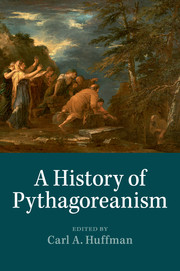Book contents
- Frontmatter
- Contents
- Contributors
- Abbreviations
- Introduction
- Chapter 1 Pythagoras
- Chapter 2 Philolaus
- Chapter 3 Archytas
- Chapter 4 Sixth-, fifth- and fourth-century Pythagoreans
- Chapter 5 The Pythagorean society and politics
- Chapter 6 The Pythagorean way of life and Pythagorean ethics
- Chapter 7 Pythagoreans, Orphism and Greek religion
- Chapter 8 The problem of Pythagorean mathematics
- Chapter 9 Pythagorean harmonics
- Chapter 10 The Pythagoreans and Plato
- Chapter 11 Aristotle on the “so-called Pythagoreans”: from lore to principles
- Chapter 12 Pythagoreanism in the Academic tradition: the Early Academy to Numenius
- Chapter 13 The Peripatetics on the Pythagoreans
- Chapter 14 Pythagoras in the historical tradition: from Herodotus to Diodorus Siculus
- Chapter 15 The pseudo-Pythagorean writings
- Chapter 16 Pythagoreans in Rome and Asia Minor around the turn of the common era
- Chapter 17 Diogenes Laertius’ Life of Pythagoras
- Chapter 18 Porphyry's Life of Pythagoras
- Chapter 19 Iamblichus’ On the Pythagorean Life in context
- Chapter 20 Pythagoras and Pythagoreanism in late antiquity and the Middle Ages
- Chapter 21 Pythagoras in the Early Renaissance
- Bibliography
- General index
- Index locorum
- Greek index
Chapter 13 - The Peripatetics on the Pythagoreans
Published online by Cambridge University Press: 05 May 2014
- Frontmatter
- Contents
- Contributors
- Abbreviations
- Introduction
- Chapter 1 Pythagoras
- Chapter 2 Philolaus
- Chapter 3 Archytas
- Chapter 4 Sixth-, fifth- and fourth-century Pythagoreans
- Chapter 5 The Pythagorean society and politics
- Chapter 6 The Pythagorean way of life and Pythagorean ethics
- Chapter 7 Pythagoreans, Orphism and Greek religion
- Chapter 8 The problem of Pythagorean mathematics
- Chapter 9 Pythagorean harmonics
- Chapter 10 The Pythagoreans and Plato
- Chapter 11 Aristotle on the “so-called Pythagoreans”: from lore to principles
- Chapter 12 Pythagoreanism in the Academic tradition: the Early Academy to Numenius
- Chapter 13 The Peripatetics on the Pythagoreans
- Chapter 14 Pythagoras in the historical tradition: from Herodotus to Diodorus Siculus
- Chapter 15 The pseudo-Pythagorean writings
- Chapter 16 Pythagoreans in Rome and Asia Minor around the turn of the common era
- Chapter 17 Diogenes Laertius’ Life of Pythagoras
- Chapter 18 Porphyry's Life of Pythagoras
- Chapter 19 Iamblichus’ On the Pythagorean Life in context
- Chapter 20 Pythagoras and Pythagoreanism in late antiquity and the Middle Ages
- Chapter 21 Pythagoras in the Early Renaissance
- Bibliography
- General index
- Index locorum
- Greek index
Summary
Introduction
Aristotle's students in the Peripatos (active 350–280 BC) are exceptionally important sources for the history of Pythagoreanism. Although none of their treatments of Pythagoreanism survive, numerous excerpts are found in later authors such as Iamblichus and Porphyry. Only one book devoted to Pythagoreanism had been written earlier than those of Aristotle and his students: Anaximander of Miletus’ lost treatise on the Pythagorean symbola (c. 400 BC – Burkert 1972a: 166). The early Peripatos increased this number tenfold. Aristotle himself wrote two books on the Pythagoreans and three on Archytas (Huffman 2005: 583–4). Aristotle's pupil Aristoxenus contributed another five: The Life of Pythagoras, Pythagoras and His Associates, The Life of Archytas, On the Pythagorean Life and The Pythagorean Precepts. No other Peripatetic devoted an entire work to the Pythagoreans, but Dicaearchus and Clearchus made Pythagoras and Pythagoreans prominent examples in their On Modes of Life. Moreover, the early Peripatos included the Pythagoreans in its grand surveys of accomplishments in the sciences. None of these survive, but they were again important sources for the later doxography. The most striking characteristic of these works (Theophrastus’ Physical Opinions, Meno's Collection of Medical Views and Eudemus’ Histories of Arithmetic, Geometry, Astronomy and Theology as well as his Physics) is their universal failure to mention Pythagoras himself, always referring instead to the Pythagoreans as a group or to specific Pythagoreans such as Archytas or Philolaus. Pythagoras does appear in the works on biography and ways of life by Aristoxenus and Dicaearchus as well as in a later anecdote of Hieronymus of Rhodes (290–230 BC). The Peripatetic view of Pythagoras mirrors the split in the tradition that was present in the earliest sources: Aristoxenus (and Chamaeleon who is probably dependent on him) follow Empedocles in being overwhelmingly positive, whereas Dicaearchus and Hieronymus are heirs to Heraclitus’ bitter critique. In terms of amount of material, the Peripatetics put greatest emphasis on the way of life of Pythagoras and later Pythagoreans. Accordingly I will spend the bulk of the chapter on these topics, after first surveying the Peripatetic view of their contribution to the sciences.
- Type
- Chapter
- Information
- A History of Pythagoreanism , pp. 274 - 295Publisher: Cambridge University PressPrint publication year: 2014
- 7
- Cited by

